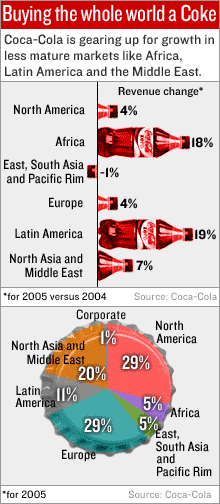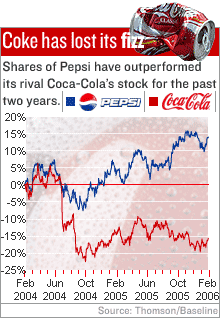|
No fizz in Coke's stock
Stock Spotlight: Coca-Cola's recent track record is rife with missed opportunities -- will new products put the sparkle back?
NEW YORK (CNNMoney.com) - Legendary investor Warren Buffett professes to drink five Cherry Cokes a day and his company, Berkshire Hathaway, owns a whopping 8 percent of the Coca-Cola Company. So when Buffett recently resigned from Coke's board of directors, saying he needed more time for his other duties, investors took notice. What were the real reasons underlying his departure?
Buffett was not the only board member to leave recently -- Coke (Research) has three seats to fill at its next annual meeting after its two youngest members also signaled they will step down. But Buffett reassured Wall Street somewhat by saying that he is not selling any of the company's stock. As such, Matthew Reilly, an equity analyst with Morningstar, wrote in a recent report that he thinks Buffett's move is more likely a sign that he is comfortable with Coke's management team. Coke's managers will have their work cut out for them: the company's stock price has fallen nearly 20 percent over the last two years, while arch rival Pepsi's (Research) shares have gained 12 percent. Pepsi's market capitalization briefly eclipsed Coke's in December 2005. That was the first time that happened in the companies' 108-year rivalry. And this isn't because Pepsi is selling more soda than its rival -- Coke still has the market share lead in carbonated beverages. Rather, Pepsi has jumped into surging markets like sports drinks and bottled water more rapidly than its rival. So Coke is now playing catch-up in the $230 billion global non-carbonated market, and will have to call on its historical strengths in distribution and marketing to regain the ground it lost to Pepsi. Can the company succeed? Coke goes for an energy boost
Analysts say Coke coasted for so long as the clear leader in carbonated beverages that a sense of complacency set in. For example, the company often took steps to satisfy investors' thirst for growth, such as cost-cutting and layoffs, without regard for how that would affect the business in the long-term. "They were too near-term focused on profitability and not long-term focused on brand strength," said Morningstar's Reilly in an interview. Meanwhile, Pepsi took the lead in other markets. In 2004, Pepsi's Aquafina led Coke's Dasani bottled water in market share and Pepsi's Gatorade had 80 percent of the sports drink market compared to 15 percent for Coke's Powerade, according to Beverage Digest, a prominent trade publication. While Coke sells 58 percent of carbonated drinks worldwide, it accounts for a paltry 4 percent of non-carbonated beverages, according to Reilly's report. Still, analysts say that Neville Isdell, who took over Coke's CEO post in June 2004, has been more adept than his predecessors at getting new brands off the ground. In the last six months, the company has launched hybrid energy drink Vault and a sugar-free version of its Full Throttle energy drink, for example. And the company's new marketing campaign -- Make Every Drop Count -- emphasizes that Coke is not just a soft drink maker. In 2005, the company reported healthy growth in its non carbonated beverages, which accounted for 19 percent of the company's volume of shipments, up from 17 percent in 2004. But an area of concern for the company is teas and coffees, where Coke actually lost market share in 2005. Coke has said that it will make growth in this category a major focus for 2006. Coke the world over
Coke is still poised to see major growth in international markets. In 2005 the company derived just 29 percent of its revenues from North American sales. The remainder was from international sales, which showed growth in every region except South and East Asia. "Given Coke's distributional advantage, there's still a big piece of the pie in all of their product categories on an international basis," said Reilly. China, Russia, Brazil and Turkey were standouts, according to the company. Coke says it is well-poised to reap benefits of expanding soda consumption in these major emerging markets, which the company expects to account for 45 percent of carbonated growth in the next five years. Overall, Coke shipped more than 20 billion cases worldwide in 2005 -- a record for the company. And Isdell has no shortage of international experience with the company, starting with Coke in 1966 in Zambia and working in Australia, Asia and Europe during his career. But much of Coke's international success depends on the performance of the dollar in 2006, according to Reilly. The company has benefited in recent years from a relatively weak dollar, which has made its products more attractive abroad. The dollar's year-long rise against Asian currencies are one factor behind the decline in sales in South and East Asia in 2005. And if the dollar were to make gains against the euro, the company could take a sales hit in a region that accounts for nearly a third of its annual revenue. Will investors like the new Coke?
Can an iconic brand like Coke adapt to the fast-changing landscape of beverages? The company is still unflappable on some fronts: people in over 200 countries consume 1.3 billion servings of its products each day. But Pepsi is the clear choice of investors lately. Its stock has consistently outperformed Coke's over the past few years and trades at about 20 times 2006 earnings estimates. Coke, by way of comparison, trades at 18 times estimates, near historical lows for the past five years. Yet Coke may finally be a bargain according to some analysts. Bank of America's Bryan Spillane has a "Buy" rating on the stock and wrote in a recent report that the stock is a good value at current levels. Analysts expect Coke's earnings per share to increase 5 percent in 2006 and 9 percent in 2007, according to Thomson First Call -- a substantial improvement over 2005's 2 percent increase. Reilly expects 5 percent revenue growth over the next five years based on Coke's new growth strategies. And he believes that consumers will eventually flock to higher-margin beverages, giving the company's profits a boost. With a raft of new products -- and a recognition that they will need a big marketing push -- Coke has put itself back in the race against Pepsi. The company appears to be well-poised to keep its title as the king of fizz and to gain ground in new products and international markets. And as long as Buffett decides that the stock is still worth owning, who are we to bet against the world's most famous investor? ____________________________ For a look at how Pepsi outgunned Coke, click here. MONEY's Michael Sivy likes the taste of Pepsi. Click here.
Morningstar's Reilly does not own shares of Coca-Cola and his firm does not perform investment banking. Bank of America's Spillane does not own shares of the company, but his firm has conducted investment banking activity for Coca-Cola Company. |
|



